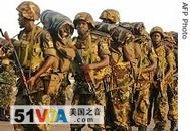Addis Ababa
06 February 2009
 |
| Ugandan soldiers taking part in African Union peacekeeping mission in Somalia (file photo) |
Uganda's ambassador to the African Union Mull Sebujja Katende says a defense ministry investigation concluded that Ugandan peacekeepers fired no shots Monday after a suicide bomber attacked their convoy in Mogadishu. Ambassador Katende says the bomber killed himself and several civilian passersby, and wounded three soldiers from the African Union force AMISOM.
"What happened is there was a suicide bomber, there was no shooting," he said. "A suicide bomb which did the damage on our troops as well as on civilians who were on site at that time."
The Ugandan account contrasts sharply with those reported by virtually every international news agency, including VOA. Reports based on eyewitness accounts, hospital sources and senior officials in Mogadishu said Ugandan troops opened fire indiscriminately on civilians after their vehicle struck a roadside bomb. Estimates of the number of dead ranged from 13 to more than 30.
Human rights groups are calling for an impartial international probe into the incident.
"AMISOM troops have the right to defend themselves from attack, but they must respond according to the laws of war," said Tom Porteous, a spokesman for Human Rights Watch in London. "We don't have solid information about what happened but the uncertainty and conflicting reports really do underscore the need for an independent investigation."
In the hours after the incident, an AMISOM spokesman denied the report of a massacre and suggested the bodies be examined to see whether they had bullet wounds or blast injuries.
Ambassador Katende says Uganda would welcome a full international inquiry to determine the truth, though security concerns might make such a probe impossible.
"We support any investigations. Anybody can undertake investigations," he said. "But as far as we are concerned, a suicide bomber did the damage, seriously injured our soldiers and killed civilians."
Ambassador Katende blamed what he called 'negative forces' for the news reports of a civilian massacre. He echoed the comments of the United Nations special representative for Somalia Ahmedou Ould-Abdallah, who charged this week that even courageous and well-intentioned Somali journalists on the ground are operating in a climate of fear in which honest reporting can be fatal.
As if to underscore the danger, a prominent Somall journalist was gunned down on Wednesday on the streets of Mogadishu. A local human rights group says Said Tahlil Ahmed of Horn Afrik is the ninth journalist to be killed in the country since the beginning of 2007, making Somalia one of the most dangerous places in the world for journalists.
Tom Porteous of Human Rights Watch says the atmosphere of intimidation makes it difficult to know the truth.
"One of the problems of the situation in Somalia is it is difficult to get independent impartial corroboration of what's going on the ground," he said. "There are reports on all different sides of different things happening. And certainly we welcome the fact that the Ugandan government also agrees there is a need for an independent international investigation."
African Union officials this week said at least 1,700 peacekeepers from Burundi and Uganda will be deployed in Somalia by the end of February. That would bring AMISOM from its current strength of 3,400 to more than 5,000 troops.
AMISOM has been stretched since last month's withdrawal of Ethiopian troops, who had propped up Somalia's fragile transitional government for the past two years. The hardline Islamist militant group al-Shabab had waged a relentless war against Ethiopian troops. After the withdrawal, an al-Shabab spokesman said the focus of the war would be shifted to AMISOM, whom he called 'foreign occupiers."